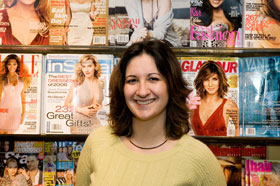  |
| HOME | THIS ISSUE | CALENDAR | GRANTS | BACK ISSUES | < BACK | NEXT > |
Ultra-thin models may hurt women’s self-esteem, study findsby Beth Krane - December 11, 2006 |
|||
| Magazine ads featuring ultra-thin models may make young women feel worse about themselves, especially if they already suffer from poor body image, according to a new study conducted by Gayle Bessenoff, an assistant professor of psychology based at the Stamford campus. Bessenoff's findings were published in the most recent issue of Psychology of Women Quarterly. For the study, Bessenoff showed a group of 112 female psychology students at UConn a packet of ads from women's magazines such as Glamour and Vogue. Half of the students viewed clothing ads with skinny models, while the other half viewed ads of other products, without models. The students then completed a series of surveys rating their self-esteem and mood, among other variables. The young women who viewed the ads of the skinny models - or "thin-ideal" - reported lowered self-esteem and increases in body dissatisfaction, negative mood, levels of depression, and preoccupation with diet and exercise, especially if they already had poor or distorted body image, Bessenoff says. Those students who believed they were overweight and reported feeling unhappy with their bodies before the study began were almost twice as likely to compare their bodies to those of the thin models seen in the ads. Interestingly, says Bessenoff, many of the students who reported feeling good about their bodies at the beginning of the study actually got a boost from viewing the ads with skinny models. Many reported elevated mood after viewing the same ads that left those with poor body image feeling dejected. "If you're already walking around feeling badly about your body, being confronted by these kinds of images seems to bring to the surface negative feelings that were already there," Bessenoff says.
She says the study does not suggest that the media alone cause poor body image and other risk factors for developing an eating disorder. Nor did she intend to prove that was the case when she embarked upon the study. Instead, Bessenoff says, she conducted the study because of her interest in how people internalize social norms. "We are all bombarded by the same images in the media, so why aren't we all affected in the same way?" she asks. Bessenoff says the vast majority of students in her study reported feeling badly about their bodies, even if their weight and body mass index (BMI) fell within acceptable or healthy ranges. The study controlled for BMI in all the analyses, so Bessenoff concluded that it is a person's perception of being overweight, not an objective overweight status, that moderates the effects of "thin-ideal" media. Bessenoff, who joined the faculty in 2001, has also linked internalization of the "thin-ideal" with "body shame," and examined other factors that may put women at risk for comparing themselves to thin models. She is currently using the findings of this research to help develop interventions to prevent the negative effects of internalizing the thin-ideal. |
| ADVANCE HOME UCONN HOME |
